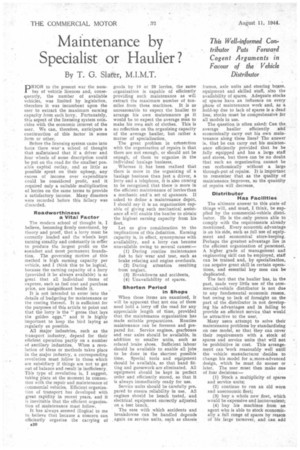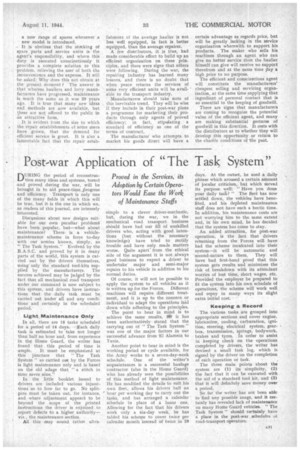Maintenance by Specialist or Haulier?
Page 32

Page 33

If you've noticed an error in this article please click here to report it so we can fix it.
By T. G. Slater, M.I.M.T.
This WeThinformed Contributor Puts Forward Cogent Arguments in Favour of the Vehicle Distributor
PRIOR to the present war the number of vehicle licences and, consequently, the number of available vehicles, was limited by legislation, therefore it was incumbent upon the user to extract the maximum earning capacity from each lorry. Fortunately, this aspect of the licensing system coincides with the economic interest of the user. We can, therefore, anticipate a -continuation of this factor in some form or other.
Before the licensing system came into force there was a school of thought that mgintained that if a driver and four wheels of some description could be put on the road for the smallest possible capital outlay, and as little as possible spent on their upkeep, any excess of income over expenditure could be considered profit, and it required only a suitable multiplication of lorries on the same terms to provide it satisfactory income. Many disasters were recorded before this fallacy was discarded.
Roadworthiness a Vital Factor The modern school of thought is, I believe, becoming firmly convinced, by theory and proof, that a lorry must be correctly loaded and the wheels kept turning steadily and constantly in orfler to produce the largest profit on the soundest and most permanent foundation. The governing motive of this method is high earning capacity per vehicle, and I think this to be logical, because the earning capacity of a lorry (provided it he always available) is so great that all individual items of expense, such as fuel cost and purchase price, are insignificant beside it.
It is not intended to enter into the details of budgeting for maintenance or the costing thereof. It is sufficient for the purposes of this article to point out that the lorry is the " goose that lays the golden eggs," and it is highly impoftant to keep the bird laying as regularly as possible.
All major industries, such as the transport industry, depend for their efficient operation partly on a number of ancillary industries. When a revolution of ideas or methods takes place in the major industry, a corresponding revolution must follow in those which are subsidiary if things are not to get out of balance and result in inefficiency. This type of revolution is, I suggest, taking place at the moment in connection with the repair and maintenance of commercial vehicles. Efficient organization of transport has developed with great rapidity in recent years, and it is inevitable that the efficient organization of maintenance must follow.
It has always seemed illogical to me to believe that because a concern can efficiently organize the carrying of
ASO
goods by 10 or 20 lorries, the same organization is capable of efficiently providing such maintenance as will extract the maximum number of tonmiles from these machines. It is as unreasonable to expect the haulier to arrange his own maintenance as it would be to expect the average man to make his own suit of clothes. This is no reflection on the organizing capacity of the average haulier, but rather a matter of specialization.
The great problem in connection with the organization of repairs is that there are not enough, or should not be enpugh, of them to organize in the individual haulage business.
Whereas it has been realized that there is more in the organizing of a haulage business than just a driver, a lorry and a telephone, it is also coming to be recognized that there is more in the efficient maintenance of lorries than a mechanic and 'a set of spanners. If asked to define a maintenance depot, I should say it is an organization capable of giving such mechanical assistance at will enable the haulier to obtain the highest earning capacity from his fleet.
Let us give consideration to the implications of this definition. Earning capacity is, in effect, synonymous with availability, and a lorry can become unavailable owing to several causes:— (1) During routine maintenance due to fair wear and tear, such as brake refacing and engine overhauls.
(2) During attention resulting from neglect.
(3) Breakdowns and accidents.
(4) Unavailability of spares.
Shorten Period in Shops
When these items are examined, it will be apparent that not one of them need hold a lorry off the road for any appreciable length of time, provided that the maintenance organization has made suitable preparations. Routine maintenance can be foreseen and prepared for. Service engines, gearboxes and rear axles should be available, in addition to smaller units, such as refaced brake shoes, Sufficient labour should be available to enable all jobs to be done in the shortest possible time. Special tools and equipment should be available, so that hand fitting and guesswork are eliminated. All equipment should be kept in perfect order and efficiently stored, so that it is always immediately ready for use.
Service units should be Carefully prepared to ensure reliability in use. All engines should be bench tested, and electrical equipment correctly adjusted on a test bench.
The ease with which accidents and breakdowns can be handled depends • again on service units, such as chassis
frames, axle units and steering boxes, equipment and skilled staff, also the availability Of spares. Adequate stocks of spares have an influence on every phase of maintenance work and, as a bold-up due to lack of spares is a dead loss, stocks must be comprehensive for all models in use.
The question is often asked: Can the average haulier efficiently and economically carry out his own maintenance along these lines? The answer is, that he can carry out his maintenance efficiently provided that he be fully equipped and has a large staff and stores, but there can be no doubt that such an organization cannot be run ecohomically without a large through-put of repairs. It is important to remember that as the quality of• maintenance improves, so the quantity of repairs will decrease,
Distributor Has Facilities The ultimate answer to this state of things will, and must, I think, be supplied by the commercial-vehicle distributor. He is the -only person able to comply with the requirements already mentioned. Every economic advantage is on his side, such as full use of equipment and economical store-keeping. Perhaps the greatest advantage lies in the efficient organization of personnel. A higher grade of management and engineering skill can be employed, staff can be trained and, by specialization, can acquire great skill in certain operations, and essential key men can be duplicated.
The fact that the haulier has, in the past, made very little use of the commercial-vehicle distributor is not due to any fundamental economic reason, but owing to lack of foresight on the part of the distributor in not developing his advantages and in failing to provide an efficient service that would be attractive to the user.
Many users attempt to solve their maintenance problems by standardizing on one model, so that they can cover their requirements with a stock of spares and service units that will not be prohibitive in cost. This arrangement can 'work reasonably well until the vehicle manufacturer -decides to change his model for a; more-advanced design, which he must do sooner or later. The user must then make one of four decisions:—
(1) Stock a multiplicity of spares and service units; (2) continue to run an old worn and uneconomic fleet; (3) buy a whole new fleet, which would be expensive and inconvenient; (4) buy his machines from an agent who is able to stock economic-. ally a full range of spares by reason of his large turnover, and can add a new range of spares whenever a new model is introduced.
It is obvious that the stacking of spare parts and service units is the agent's responsibility, and where this duty i3 executed conscientiously it provides a complete solution to this problem, relieving the user of both the inconvenience and the expense. It will be asked: Why does this not obtain at the present moment ? The answer is that whereas hauliers and lorry manufacturers have progressed, maintenance is much the same as it was 20 years ago. It is true that many new ideas and methods are now available, but these are not offered to the public in an attractive form, It is evident from the size to which the repair establishments of some users have grown, that the demand for efficient service is great. It is also a lamentable fact that the repair estab lishment of the average haulier is not less well equipped, in fact is better equipped, than the average repairer.
A few distributors, it is true, had made considerable effort to build up an efficient organization on these principles, and there were signs that others were following. During the war, the repairing industry has learned many lessons, and there is no doubt that when peace returns the services of some very efficient units will be available to the transport industry.
Manufacturers should take note of this inevitable trend. They will be wise if they include in their post-war plans a programme for marketing their products through only agents of proved efficiency; in fact, stipulating a standard of efficiency as one of the terms of contract.
The manufacturer who attempts to market his goods direct will have a
certain advantage as regards price, but will be greatly lacking in the service organization wherewith to support his products. The maker who sells his machines through an agent who can give no better service than the haulier himself can give will receive no support therefrom and at the same time pay a high price to no purpose.
The efficient and conscientious agent will constitute the manufacturers' cheapest selling and servicing organization, at the same time supplying that ingredient of personal contact that is so essential to the keeping of goodwill.
There are signs that manufacturers are coming to recognize the potential value of the efficient agent, and many are making substantial gestures of goodwill in this direction. It rests with the distributors as to whether they will develop this opportunity or return to the chaotic conditions of the past.




















































